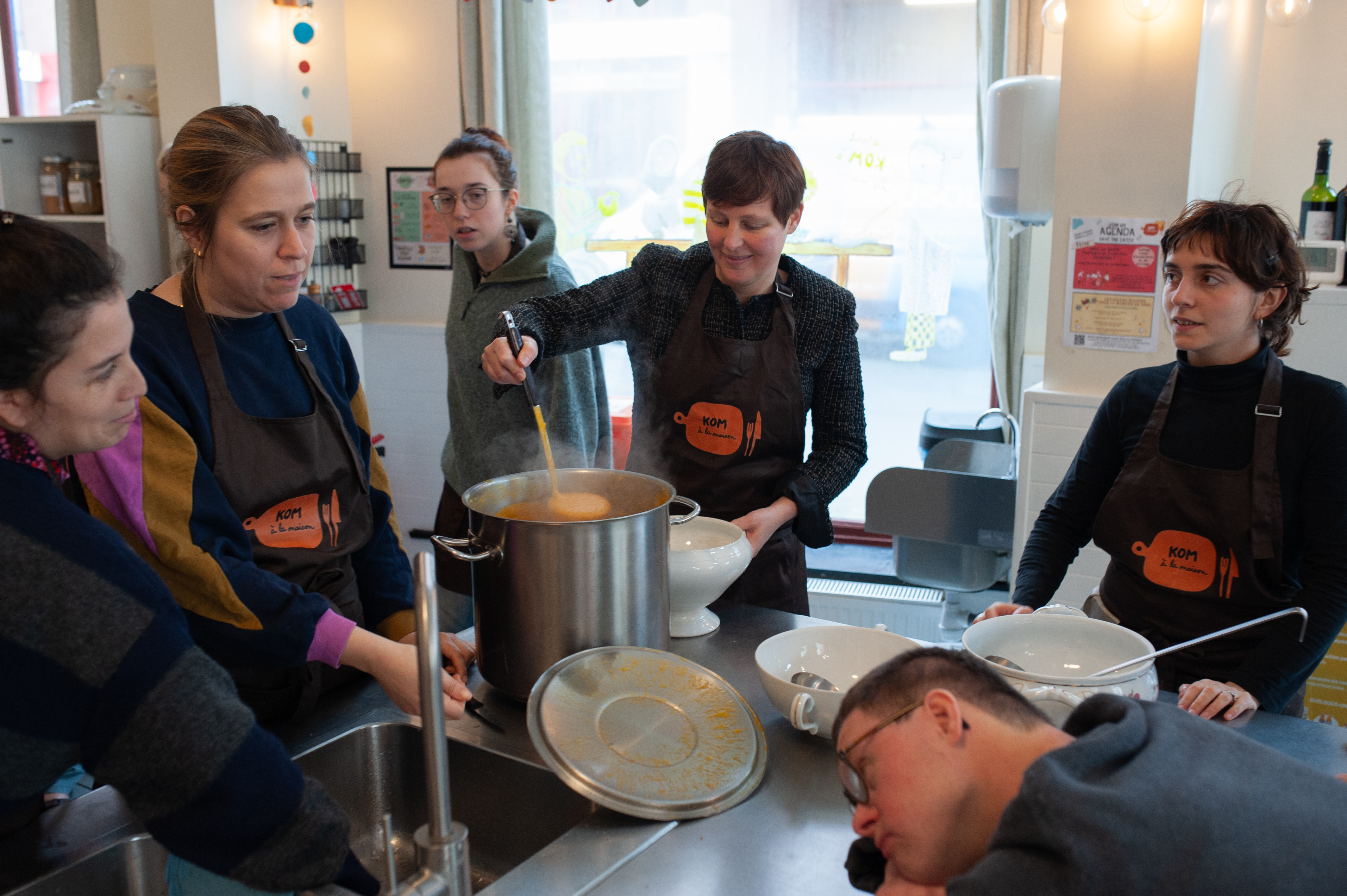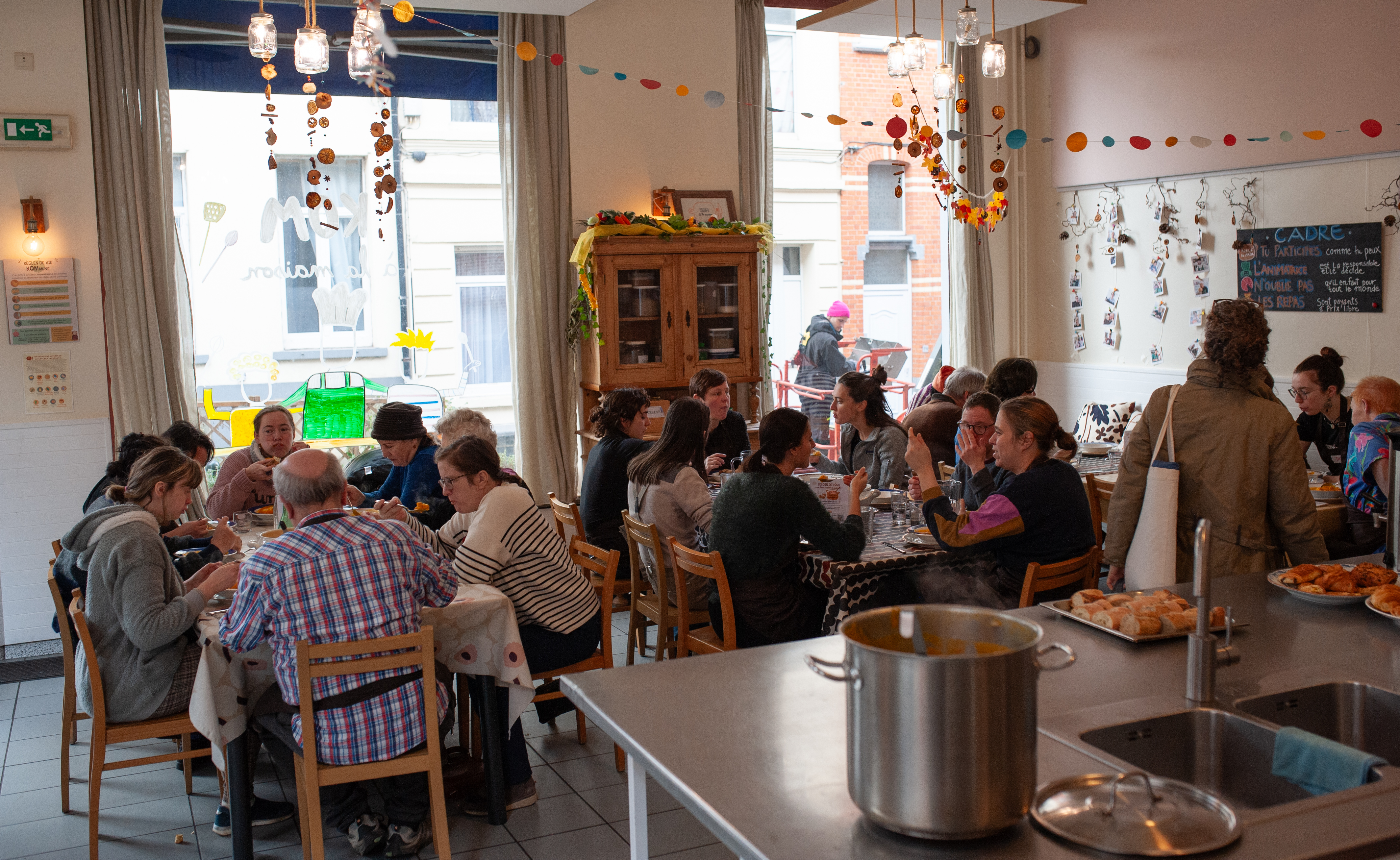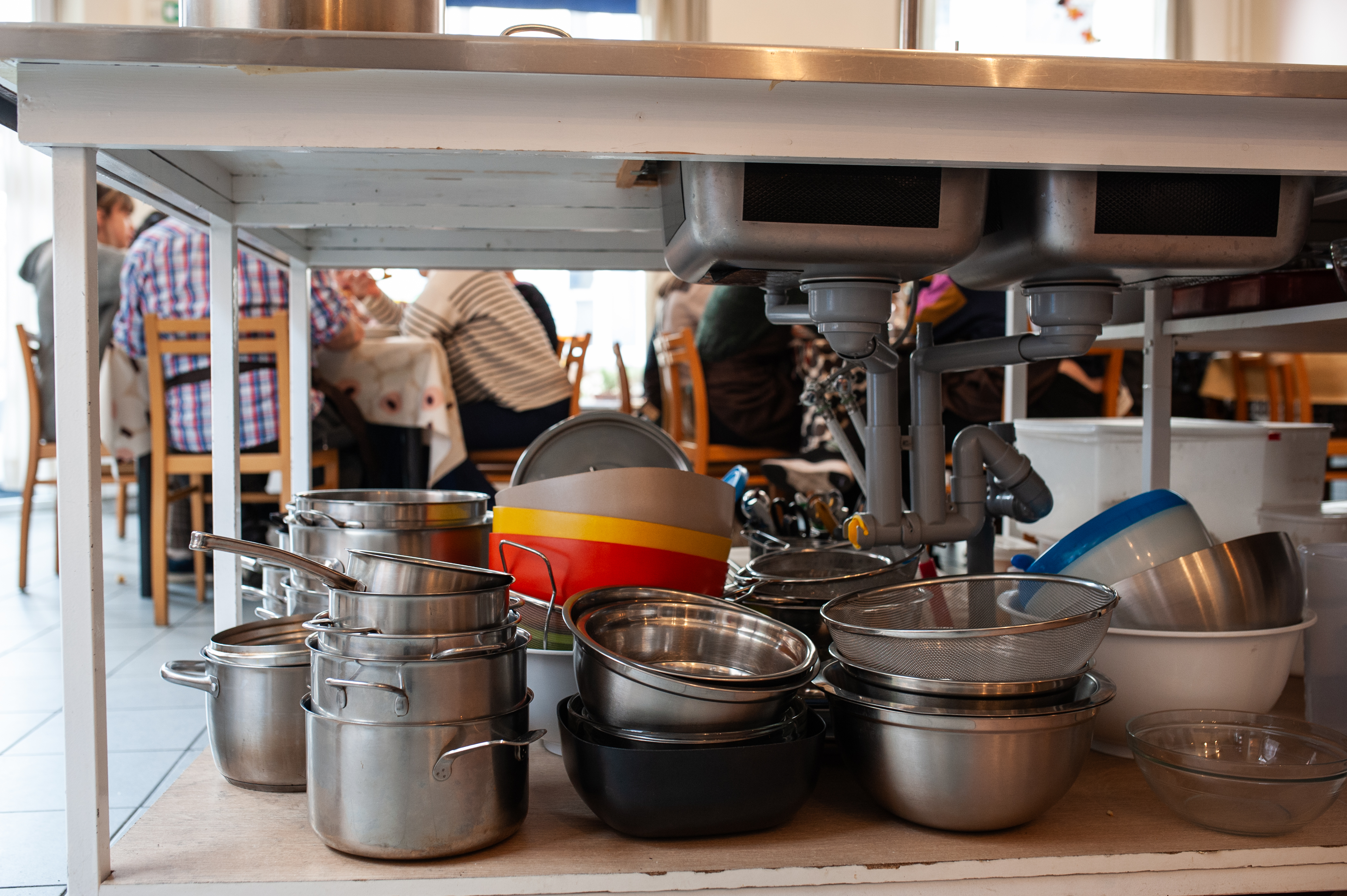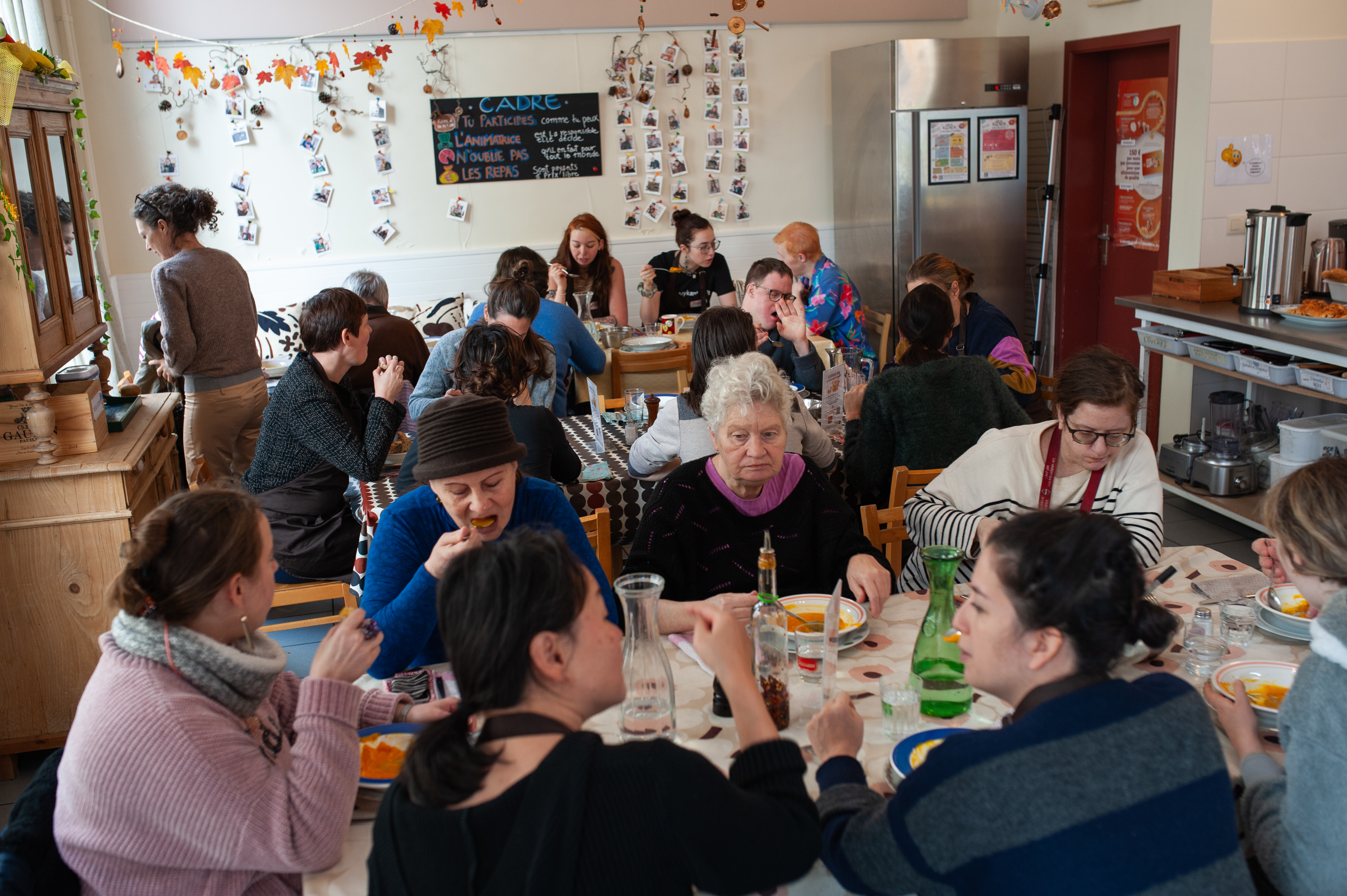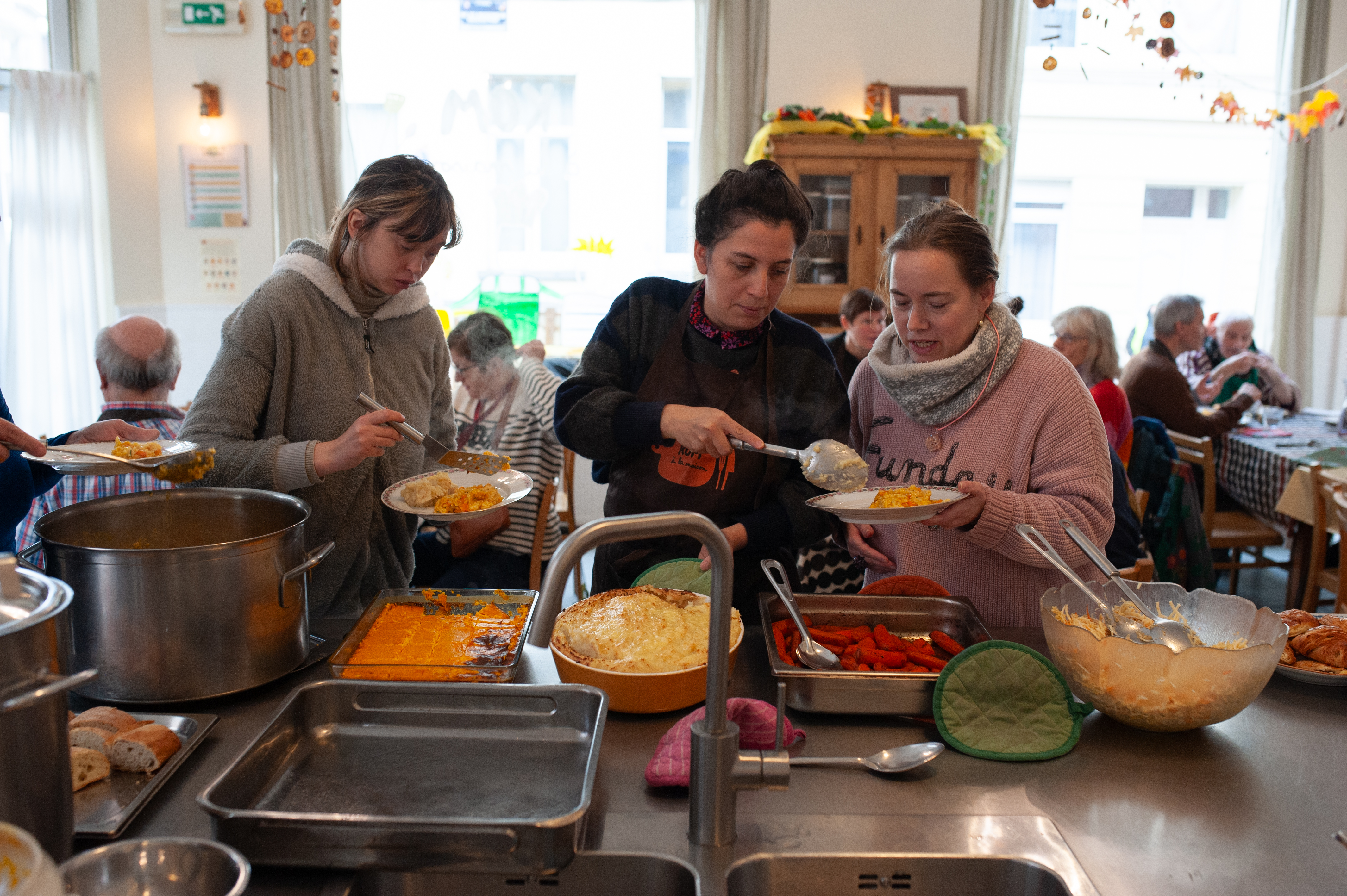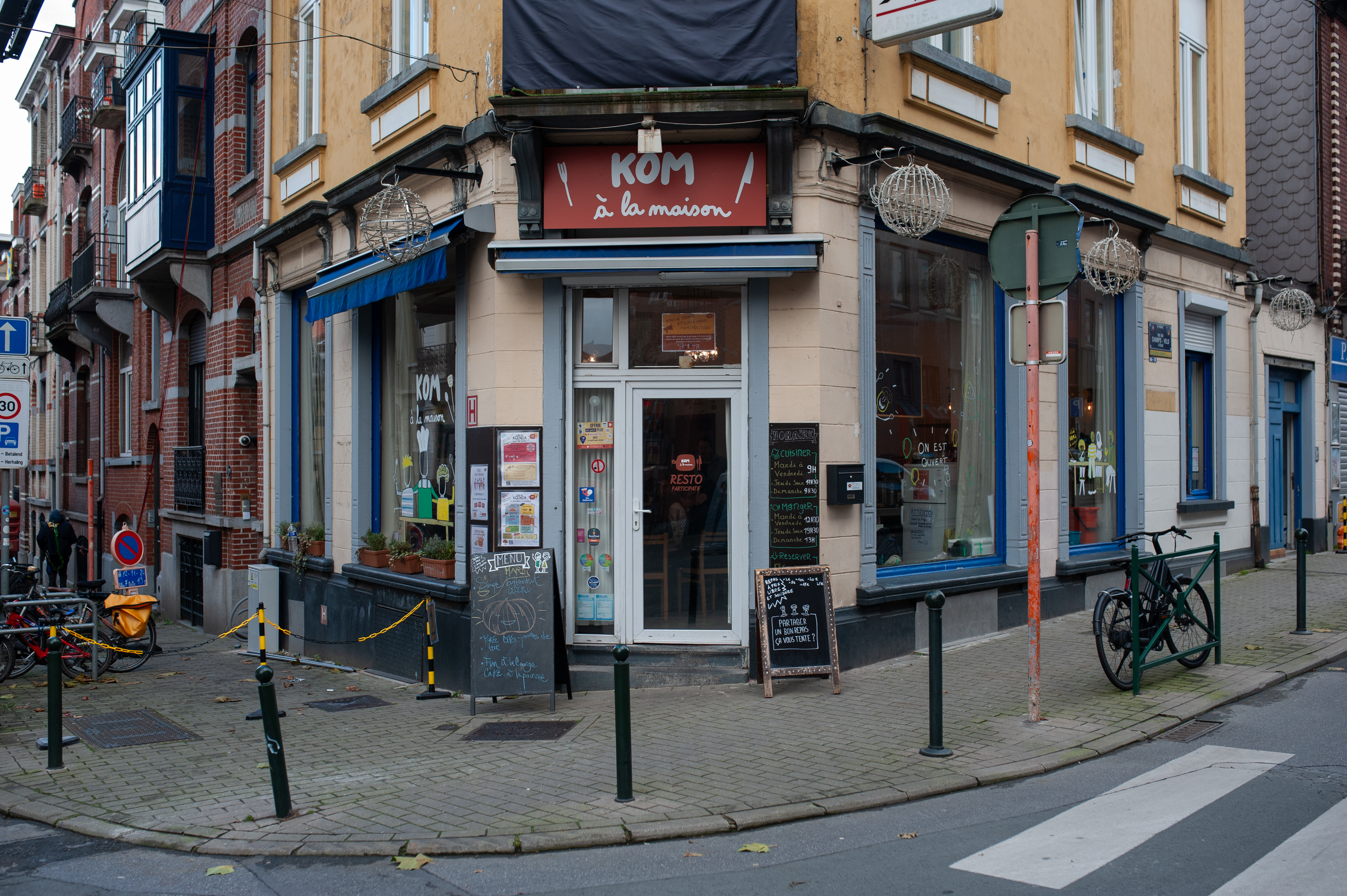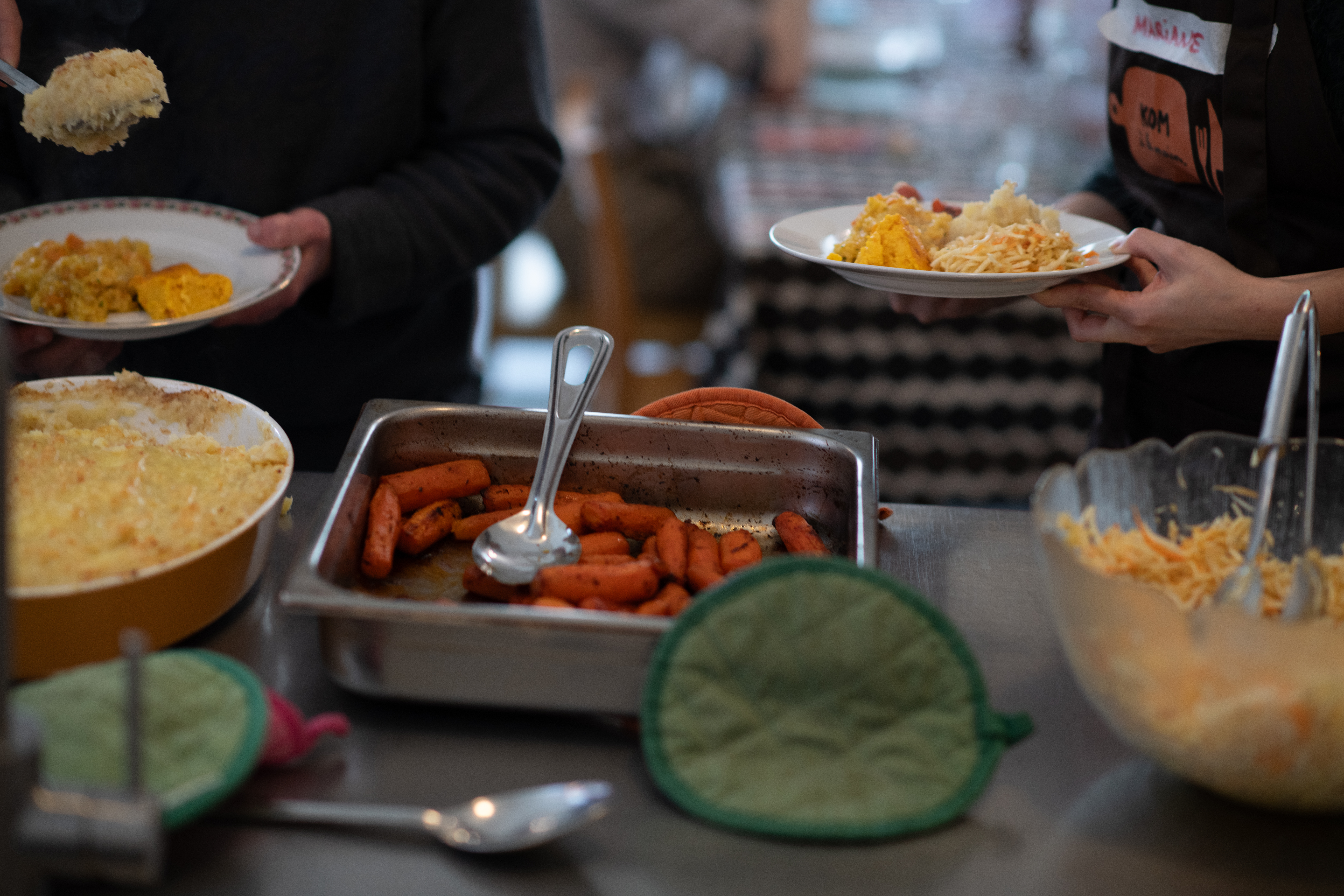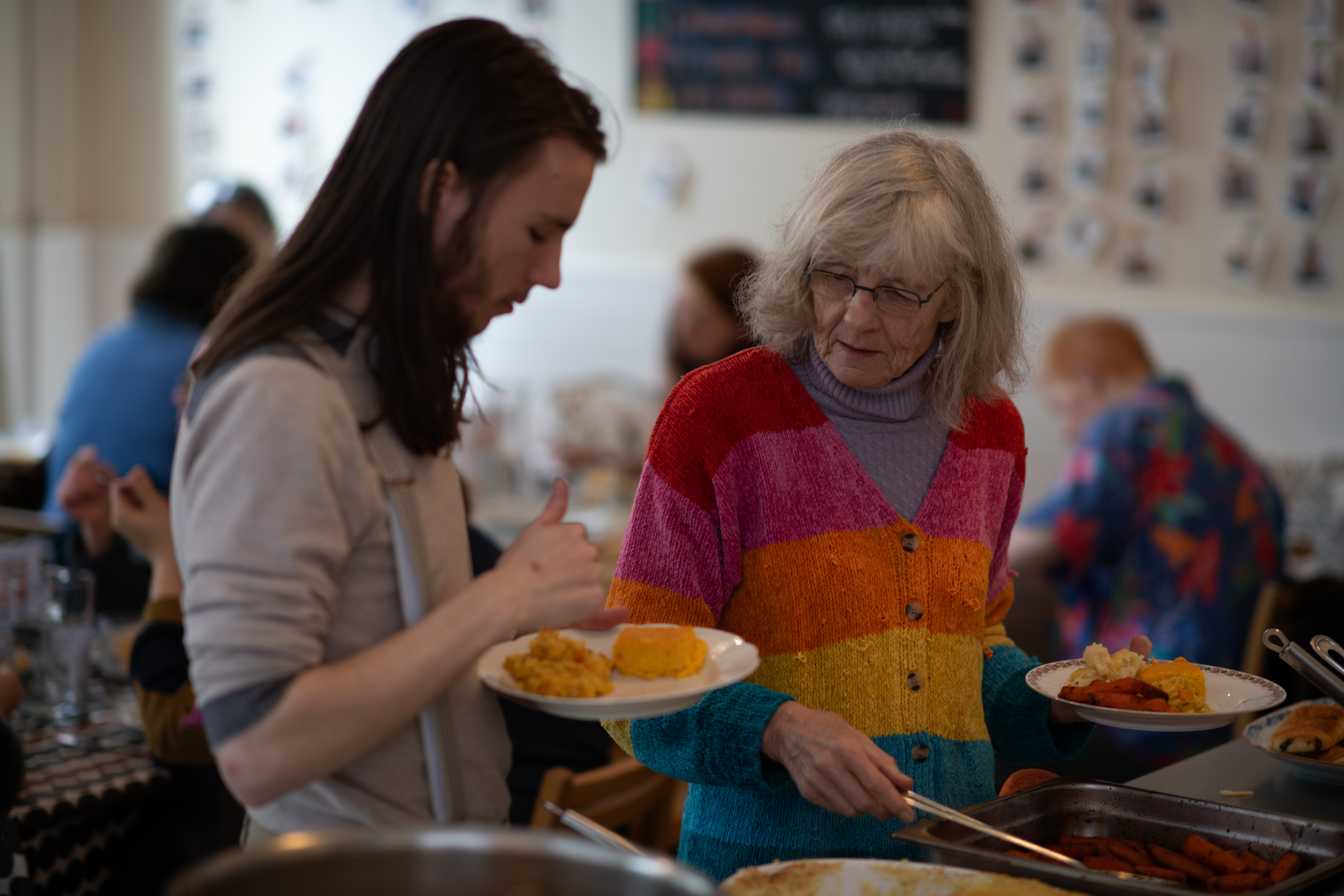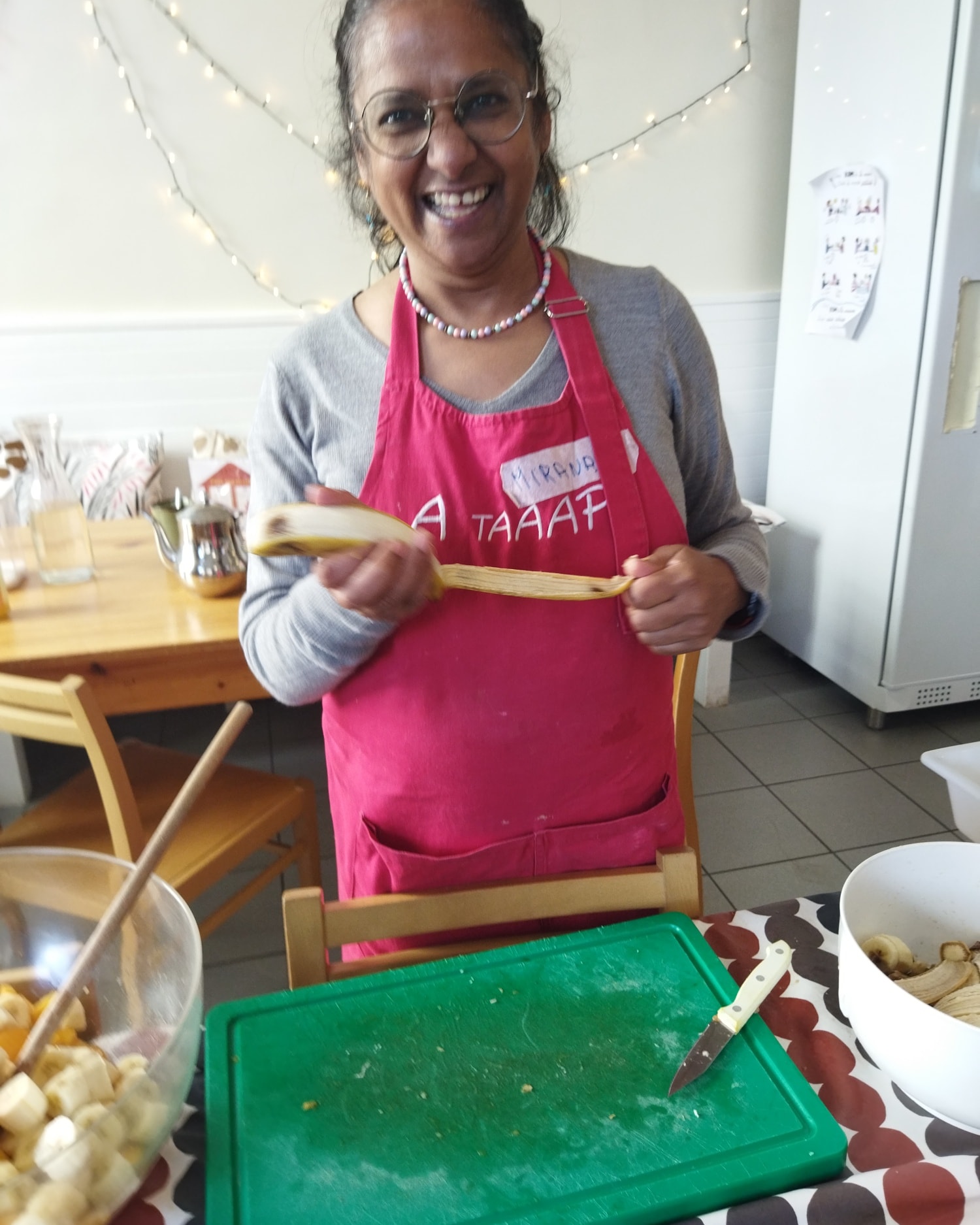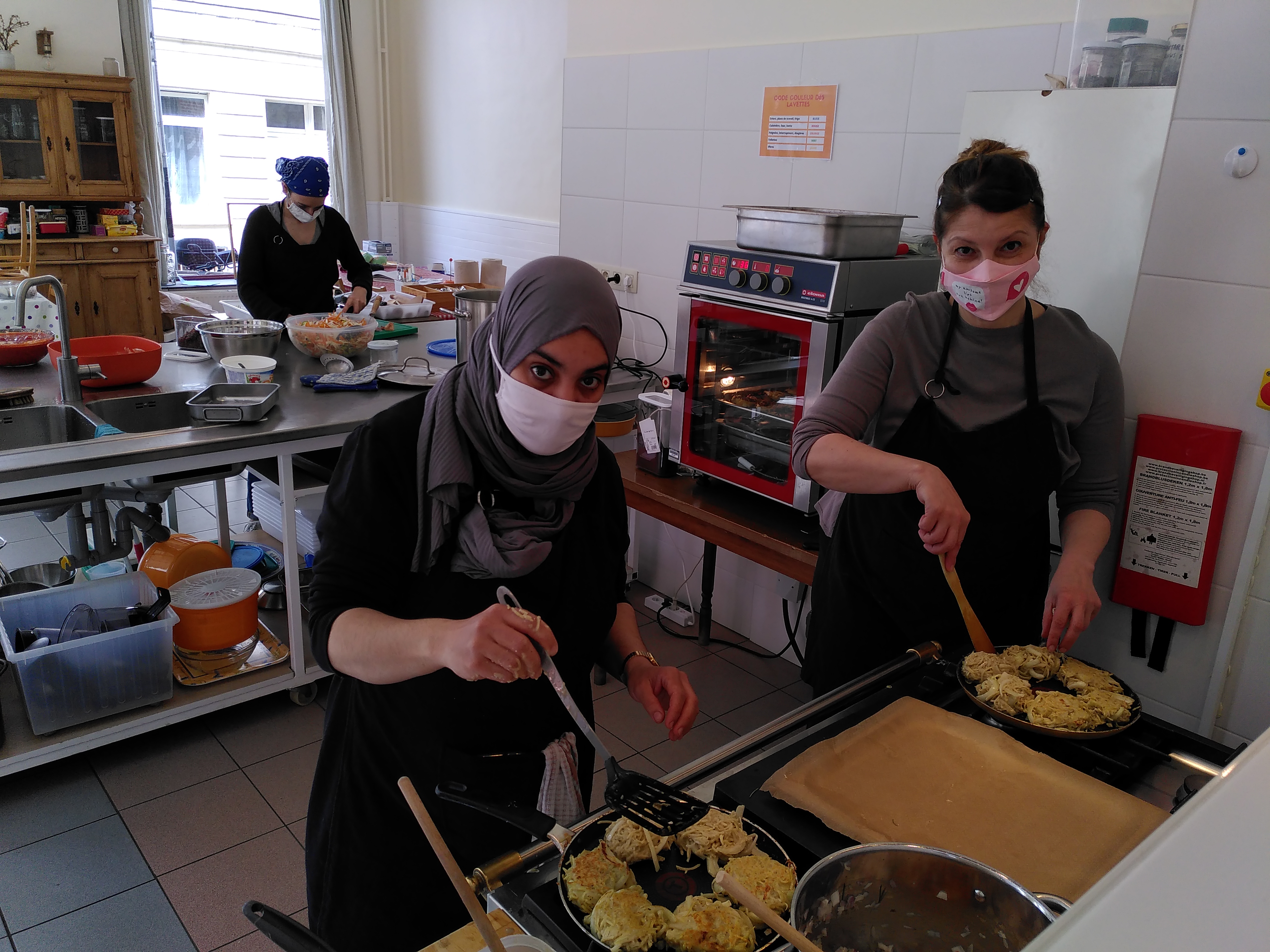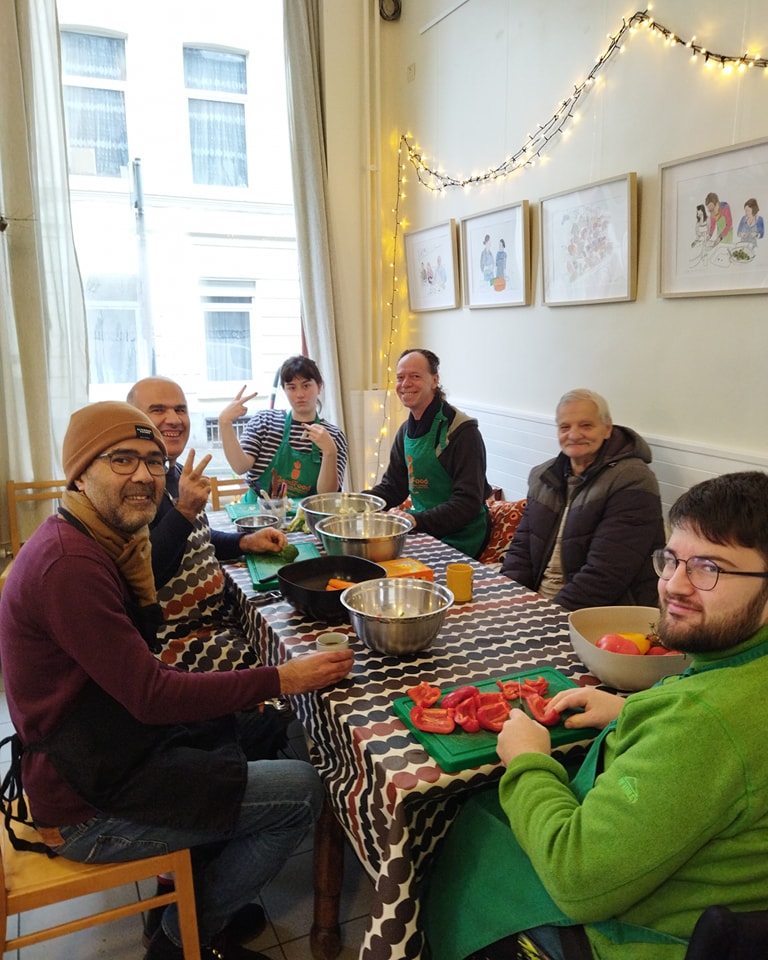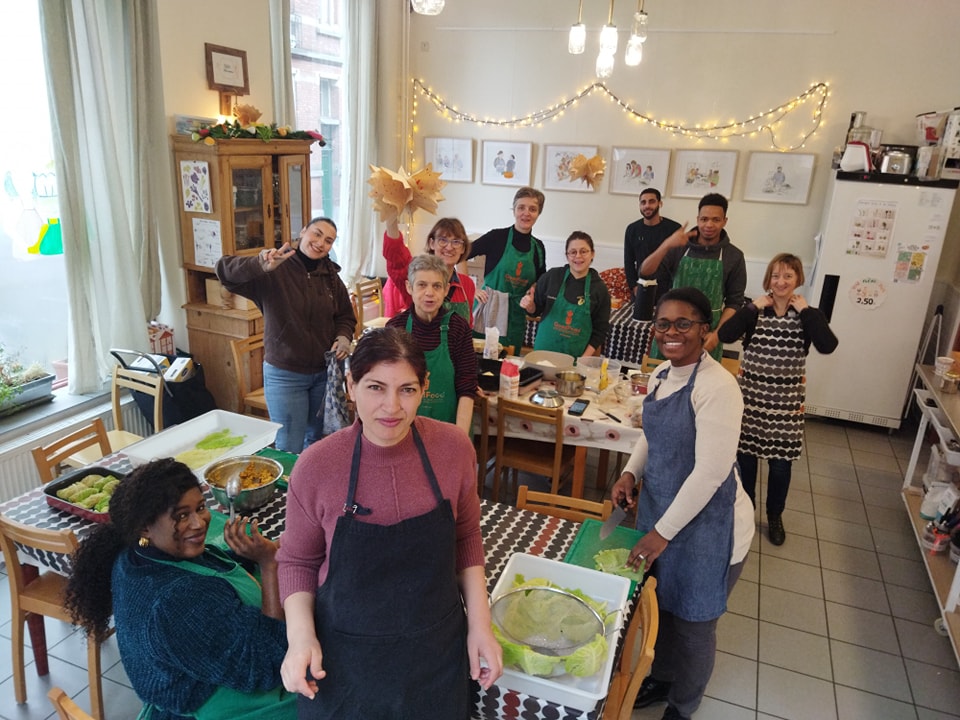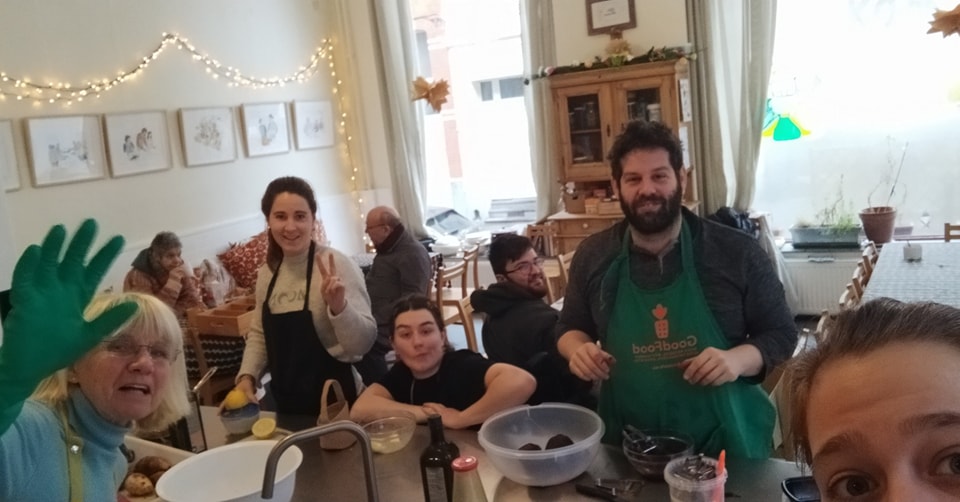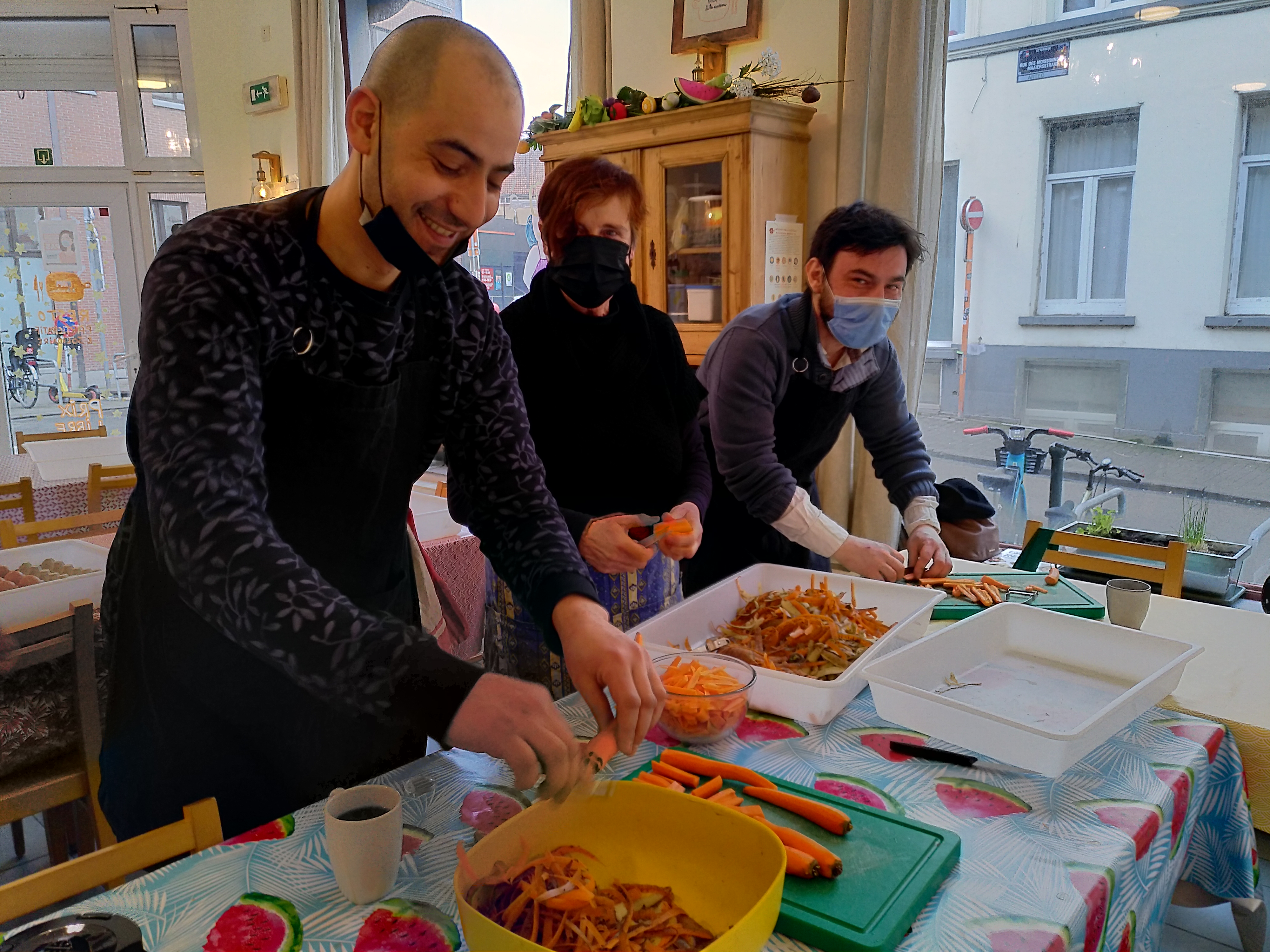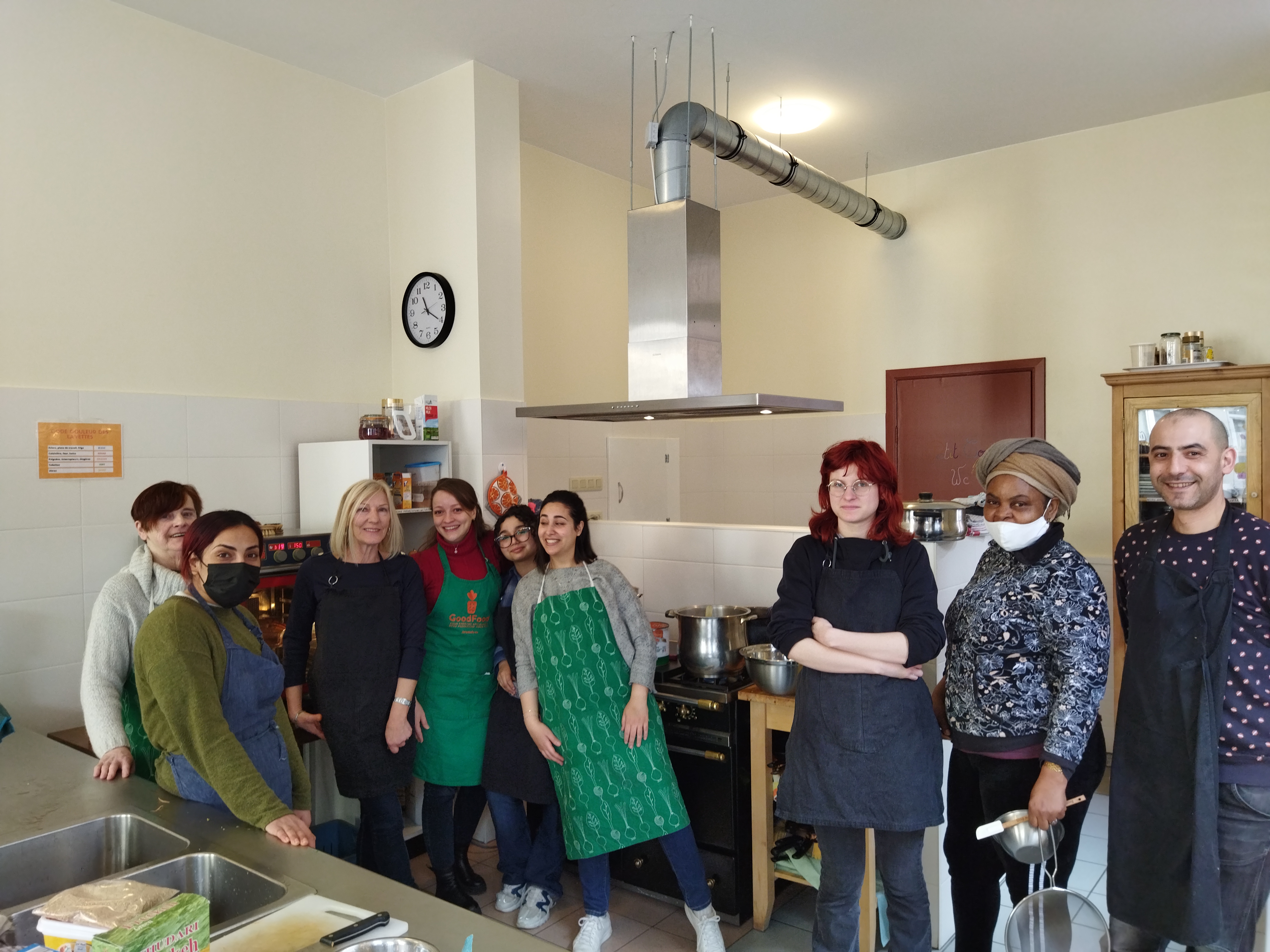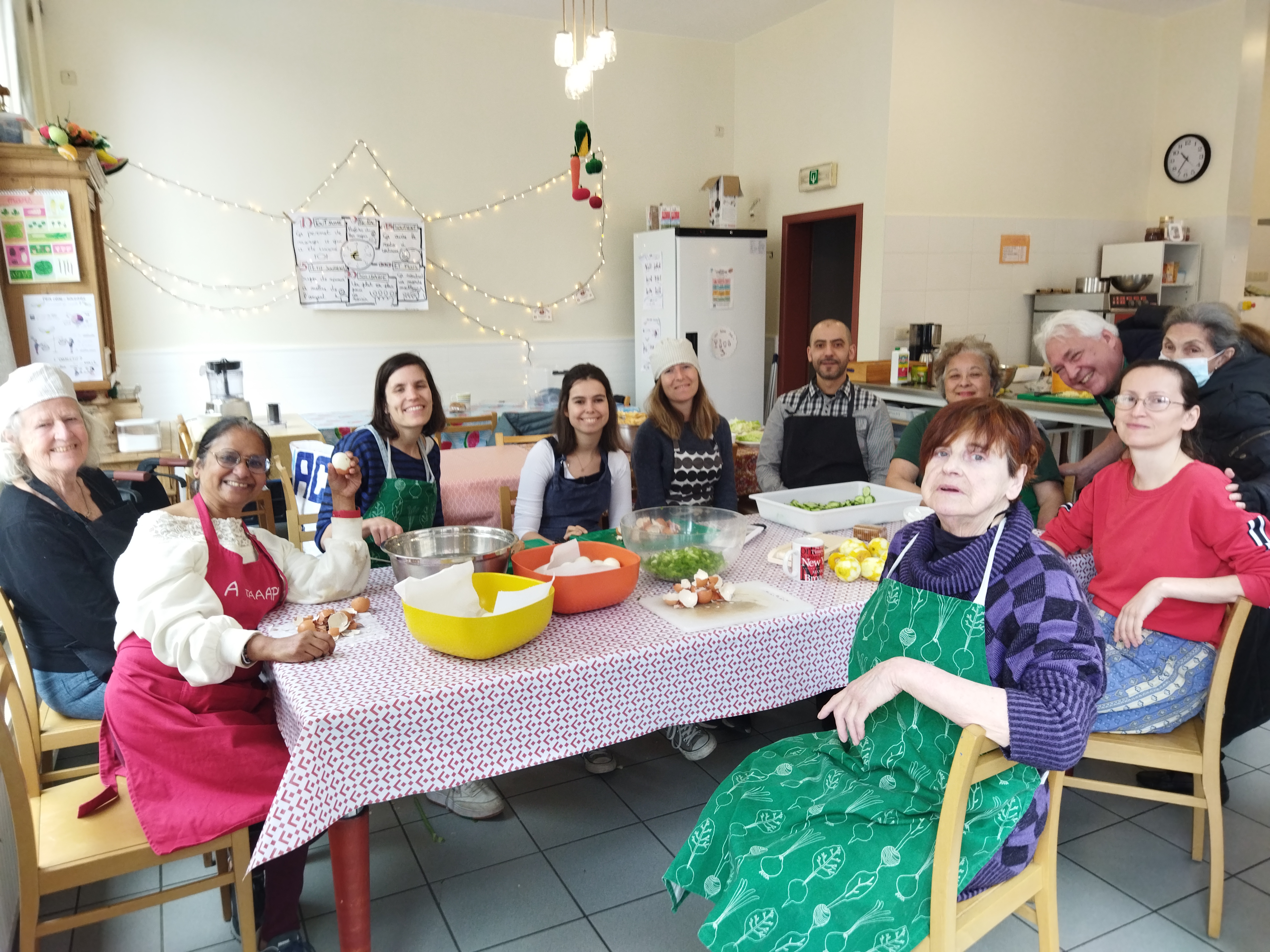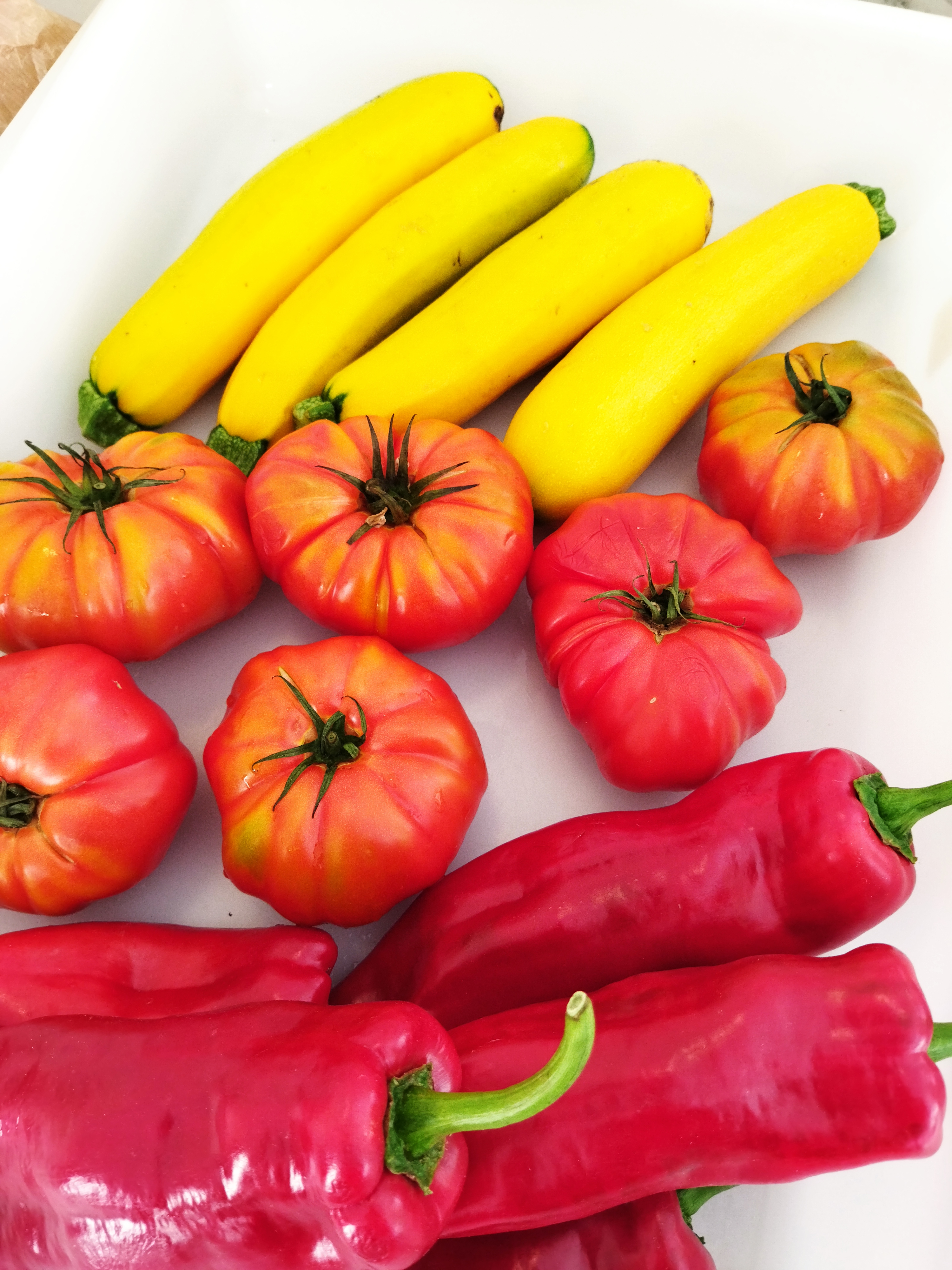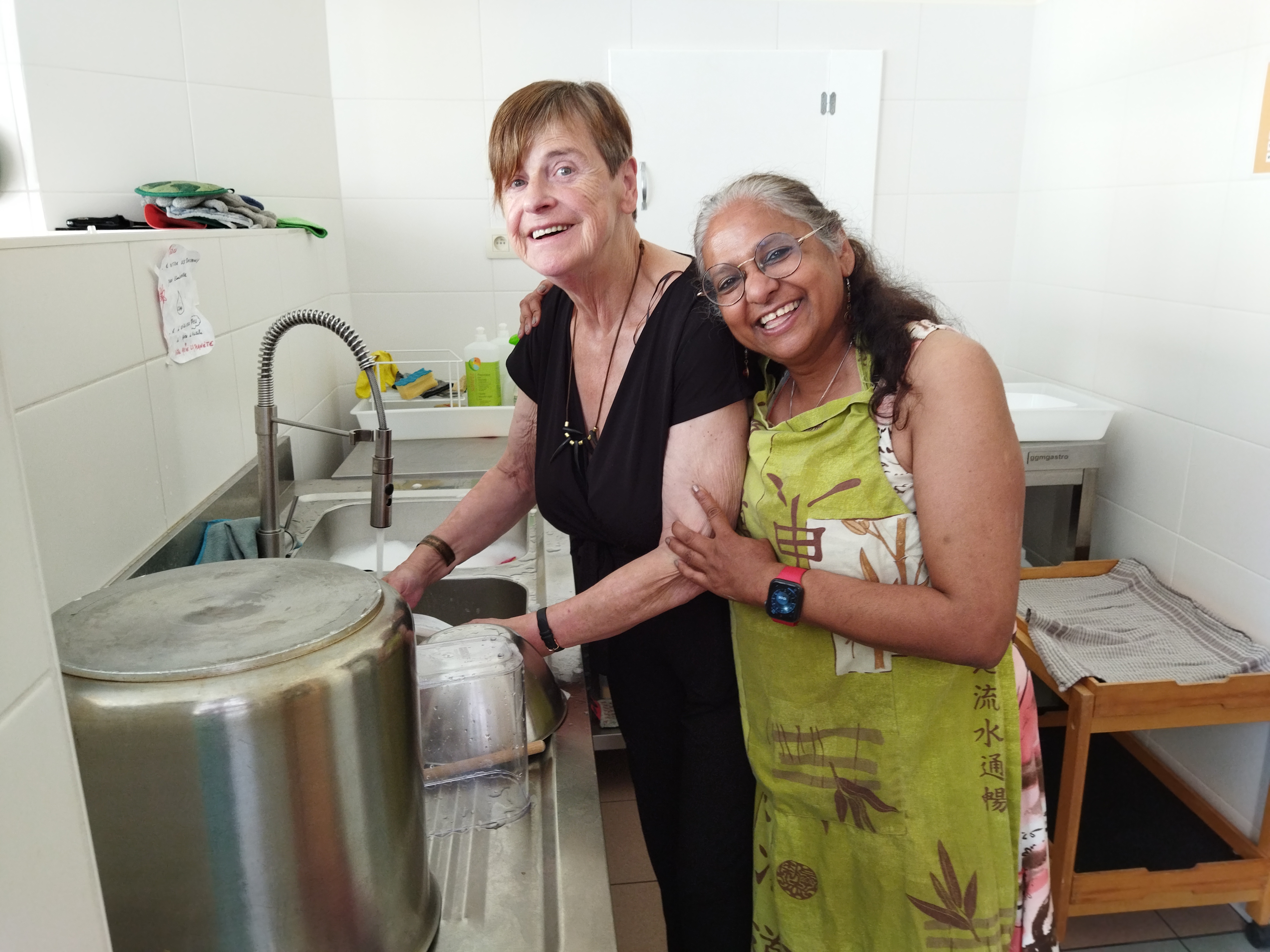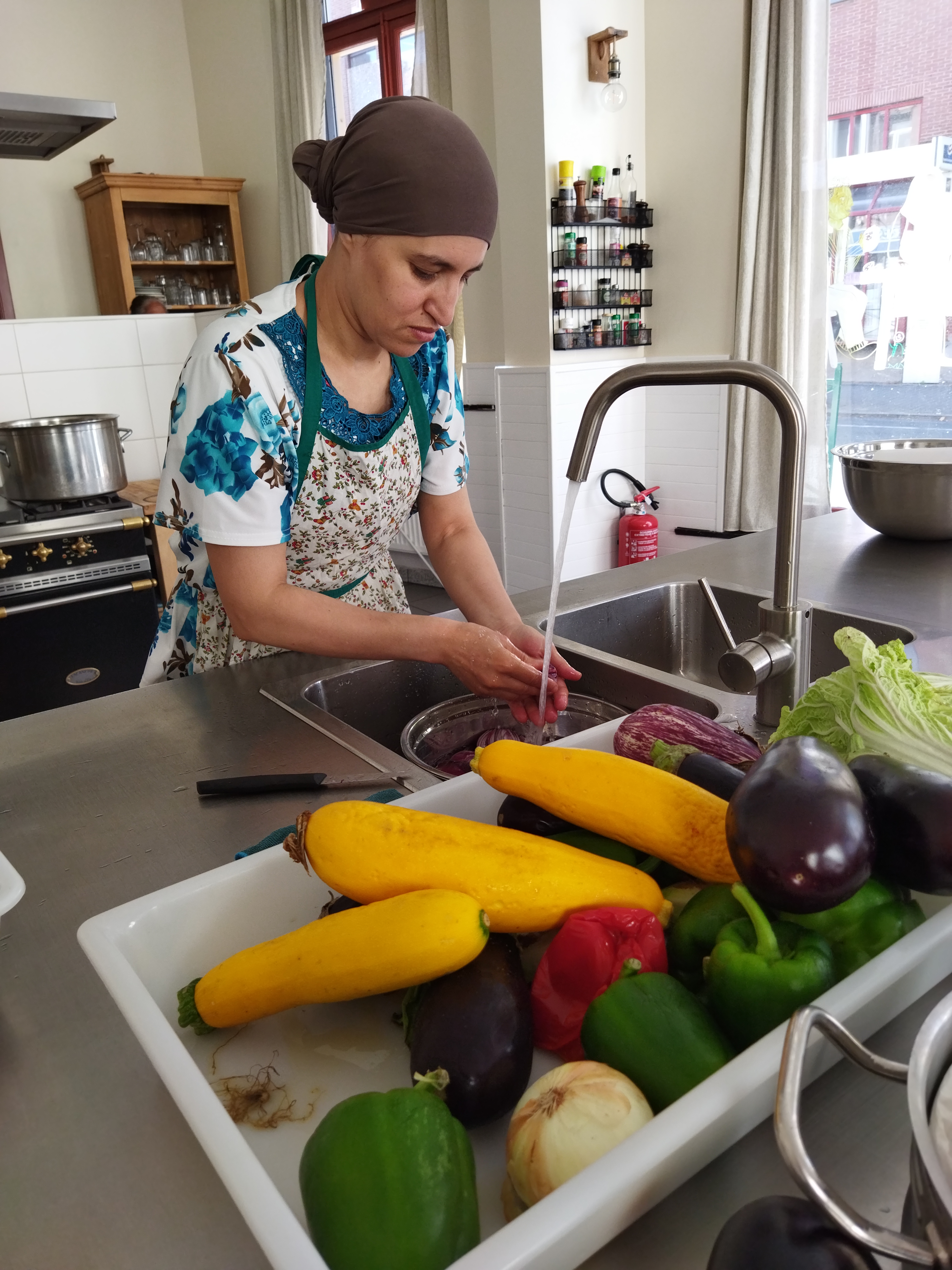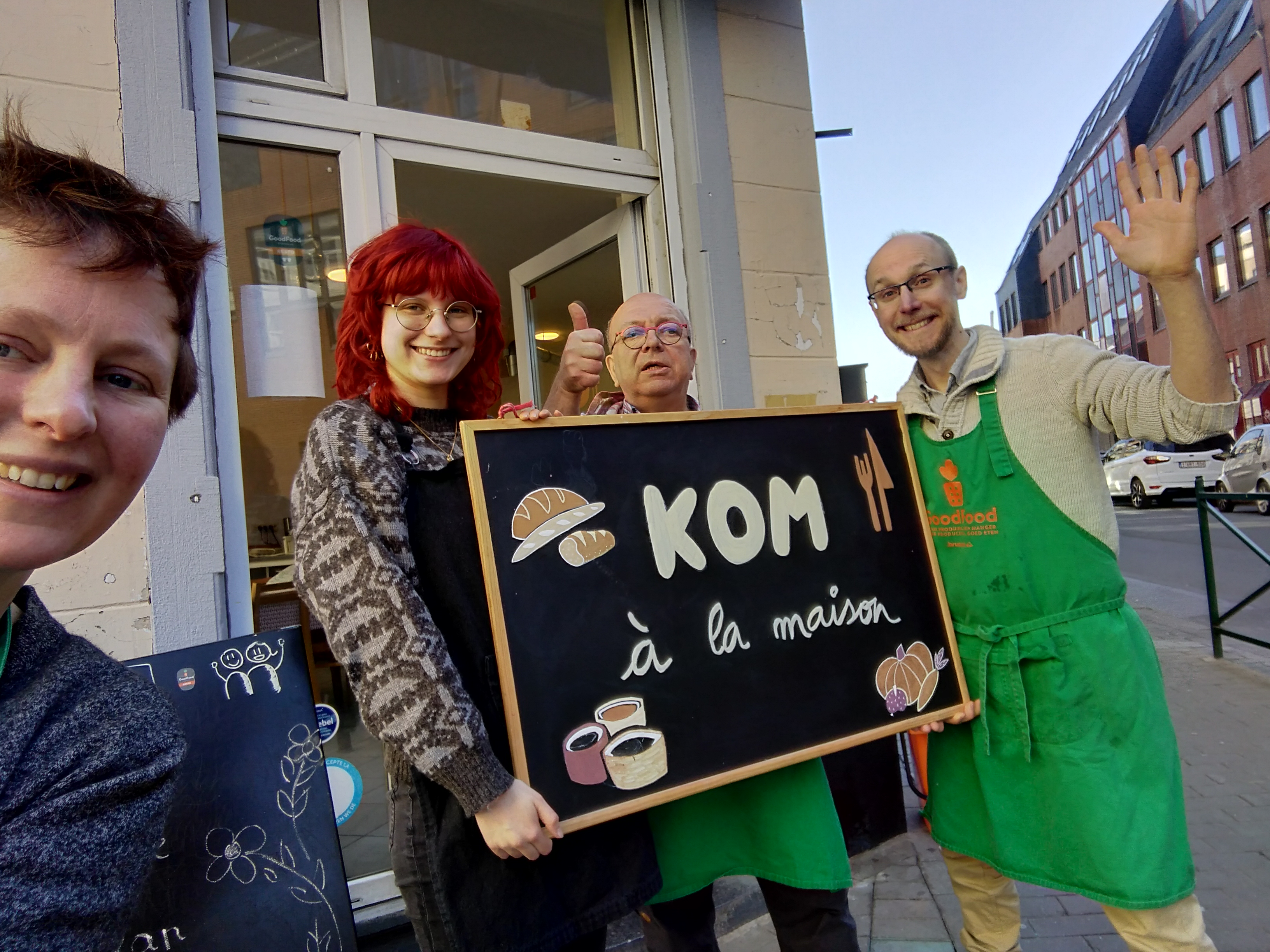Regaining a sense of belonging
The warmest meal in town
KOM à la maison, the social fabric of food in Brussels
KOM à la maison is a pay-what-you can local community restaurant in Brussels, providing the neighbourhood's inhabitants with six healthy and veggie meals per week. In this one-of-a-kind restaurant in Belgium, local residents can meet, cook and share meals, do the dishes, catch up with each other and exchange recipes. This unique place was imagined and crafted by citizens who wanted to cook food that is good for the people and good for the planet.
Belgium
Local
Brussels
Mainly urban
It refers to other types of transformations (soft investment)
Yes
2025-01-30
No
No
No
As a representative of an organisation
KOM à la maison is Belgium's first pay-what-you-can participative restaurant. A place where residents prepare and share warm, healthy, sustainable and affordable vegetarian meals six times a week. Our project responds primarily to the need for people to meet and get together, in a place that is easy to get to, open all-day long and not stigmatising, in order to regain a collective sense of belonging. It offers an inclusive activity that encourages social mixing and enables people on a very small budget to eat a high-quality, fresh and sustainable meal in good company. Last but not least, it has an educational value, since the sustainable practices of the restaurant (which has been awarded a "Good Food" label by the Brussels Environment Agency) are passed on to the guests. In contrast to the exclusionary logic at work in the public space or in commercial consumption, KOM à la maison allows vulnerable people to participate fully in social life. Everyone pays according to their means which makes it possible to welcome a wide variety of people: 36% of our guests pay less than 5 euros for their meal, which consists of a starter, main course and dessert, including tea or coffee, and 32% pay more than 15 euros. Still, according to a recent poll we conducted, 62% of our isolated diners earn less than 2,000 euros a month.
We are responding to the need to move towards a more inclusive and supportive society, based on trust between residents marked by a great social and cultural diversity in Brussels, and to the need to equip inhabitants to make them more resilient in the face of social, health and climate crises. They discover that it's possible to cook with raw organic produce straight from the farm, without it necessarily being more expensive (bulk purchases, priority given to local and seasonal fruit and vegetables, legumes, unprocessed products). The recipes are always tasty and of an incredible diversity, illustrating how pulling together can bring positive things.
We are responding to the need to move towards a more inclusive and supportive society, based on trust between residents marked by a great social and cultural diversity in Brussels, and to the need to equip inhabitants to make them more resilient in the face of social, health and climate crises. They discover that it's possible to cook with raw organic produce straight from the farm, without it necessarily being more expensive (bulk purchases, priority given to local and seasonal fruit and vegetables, legumes, unprocessed products). The recipes are always tasty and of an incredible diversity, illustrating how pulling together can bring positive things.
sustainable food
social inclusion
accessibility
diversity
community
Our project is situated at the crossroads of food aid, social cohesion and ecological transition.It aims at reconciling the three pillars of sustainable development in a holistic way: it offers residents a platform for participation in social and neighbourhood life - including the most economically vulnerable and people with disabilities, immigrants or mental health problems - and boosts the self-confidence and confidence in society of people with difficult life histories. It helps to reduce inequalities by providing access to quality food for people on low incomes, who often pay a symbolic amount where a person with a job might fork out 15 euros or even more for the same meal. The restaurant produces tasty meals from a wide variety of vegetables and fruit, and uses this productive activity to connect local people: it sources its produce from an organic farmer located just 25 kilometres away, thereby supporting short agricultural circuits. Our menus meet all the criteria laid down by the Brussels Environment Agency to define a ‘sustainable plate’ (local, seasonal and without animal proteins). We use vegetarian and anti-waste recipes, using organic produce, systematically sort our garbage and compost all peelings, make homemade cleaning products... these daily practices with local residents are disseminated horizontally, based on concrete public participation, and reach hundreds of people who come to cook or eat each year.
The project was initiated by women, created jobs for women (the organisation is running with 3 part time female employees = 2,4FTE) and is empowering women (68% of our public is female).
Ultimately, by advocating a civic and inclusive transformation of food, sourced locally, the restaurant prefigures certain future forms of community organisation on a neighbourhood scale that would make it possible to concretely limit the negative impacts of climate change on the daily lives of residents.
The project was initiated by women, created jobs for women (the organisation is running with 3 part time female employees = 2,4FTE) and is empowering women (68% of our public is female).
Ultimately, by advocating a civic and inclusive transformation of food, sourced locally, the restaurant prefigures certain future forms of community organisation on a neighbourhood scale that would make it possible to concretely limit the negative impacts of climate change on the daily lives of residents.
Our project aims to provide residents with access to high quality food in a dignified and rewarding way, using a bottom-up approach in which their talents, skills and participation in community life are valued and demultiplied. We give residents an unconditional welcome, offering them the chance to feel useful and to build up their self-confidence. Our public is very diverse and expresses proud to be part of the community of the restaurant, which gives them a sense of belonging and a concrete sense of achievement through the production of delights they would never be able to cook alone. There are Syrian solo mothers, people with disabilities, looking for a job, working in the surroundings, youth with mental health issues, students and elderly meeting in our kitchen. We have been working with several partner organisations to diversify even more the profiles of our participants. Their creativity and cooking talents are being rewarded on a daily basis, and emphasized with a small ritual of handclapping to thank the cooks of the day at the start of the lunch. The welcoming environment in a former neighbourhood café, located in a 120 year old building on the corner of a busy street in an area known for its hyper-diversity, is warm, simple but beautiful. We use napkins sewn by local residents, crockery donated by neighbours. Our dishes are always colourful and tasty. The experience of a meal at KOM at home, where you feel ‘at home’ and where the word ‘Kom’ in Flemish invites you to push open the door, is often transformative, breaking down barriers between guests, who share the meal at the same table, serve each other and continue their conversations while doing the dishes. The emphasis is on dignity and diversity, and this approach has been described by the local Fédération des services sociaux as a socially innovative approach in starch contrast with the sometimes patronizing way in which traditional actors of the food aid sector organize their work.
We use food preparation and the shared meals at our restaurant as an excuse to bring together inhabitants and as a booster to promote social mixity, a positive experience of diversity and allow people with low income or in a vulnerable position to access to healthy and sustainable food. This allows a high level of inclusion, which translates in the great diversity of our public in terms of age, social and cultural background, financial income etc. People tell us that they feel home and accepted as they are in our place, something they could not find before in the neighbourhood. Our governance is also highly inclusive. All strategic decisions, but also a lot of the logistics and events organisation, is decided by our "collectif citoyen" that is meeting once a month at evening time over... a nice dinner. This group is composed of people willing to engage in favour of the project on a voluntary basis by putting their shoulders under the organisation (that is lead on a daily basis by 3 part-time employees). The group is open to anyone interested in joining and reflects one of the main characteristics of our public : most members live alone or raise their child(ren) alone and most are women. The fact that the organisation is based on the involvement of a steady group of citizens acting on a voluntary basis is one of its great strenghts, but it demands also an important investment in time and energy to allow the different participants to find their place and feel free to seize the empowerment opportunity that is offered to them. The group is constantly renewing with new guests of the restaurant joining, others leaving. This citizen-based organisation is using collective intelligence tools to create space for involvement and empowerment. It is a translation on the governance level of the organisation's main values and a vibrant example of how citizen grass root implication can lead to concrete social and sustainable transformation in their neighbourhood.
The restaurant is running daily thanks to the participation of citizens. The groups are facilitated by one of our three employed female animators. We have an average of 9 persons participating in the cooking activity and more than 20 persons participating in each of our meal, according to a counting in June-July 2024. Our public is also strongly participating in the governance of the organisation, with a group of 12 to 15 people attending our monthly "réunion du collectif citoyen" where strategic decisions concerning the project and daily logistical and organisational topics are discussed and decided. The horizontal and self-managed character of our organisation is key to its identity. Participants -we call them "convives" wich refers to the concept of social cohesion or "vivre ensemble"- can propose an activity, from baking strawberry cakes to organizing an origami workshop. We have collaborated with over 40 different organisations in the past 4 years, mainly to receive their groups in the kitchen and at our tables. This has allowed us to achieve a great diversity in our citizens' cooking groups and guests. Among them, are centers for asylum seekers, pscyhiatric hospitals or day centres, youth organisations from the neighbourhood, the municipality's social services (CPAS) working with solo mothers and many others.
We have been supported from scratch by the Brussels Environnement Agency (Bruxelles Environnement) who was calling for collective kitchens and participative restaurant models to emerge in Brussels. The regional autorities (Région Bruxelles-Capitale) have been funding our project for the 4 first years of its existence. We were inspired by different European initiatives from Les Petites cantines in France (which whom we exchanged extensively at the start of our project) to the examples of some volksküche in Berlin and collective neighbourhood kitchens in countries like Spain and Portugal. We have received the support of a Belgian private Foundation, the 4Wings Foundation, who is supporting innovative initiatives working on food poverty and access to quality and sustainable food. For the implementation, we have been able to count on the incredible energy of inhabitants during the pre-opening phase where the works to renovate our premices were carried out with the support of citizen volunteers in the summer and autumn of 2020, when the Covid pandemy was still raging. We have also received the support from the Brussels-based company Euroclear who funded the investments to buy and install a professional kitchen.
Before launching the project (at the end of 2020) the initiators did an extensive research work both on improving the sustainability of the food system, on current and past food solidarity mechanisms and on general factors of well being, thanks to reports by the Brussels Environnement Agency and it's well documented "Good Food" policy. They were inspired by findings by professor Lieven Annemans (UGent) in the yearly "happiness inquiry" of Belgian Insurer NN Group that pointed out that social isolation was a general problem, impacting all age categories, and preventing the general well being of large proportions of the populations.
We also studied the Belgian cooking and eating habits in (at the time) the latest National inquiry into food consumption (dated 2014-2015 https://www.sciensano.be/sites/default/files/rapport_pa_fr.pdf) showing that a lack of time and know how was negatively impacting the time spent to cook for oneself, from fresh and unprocessed ingredients. We were also inspired by the findings of the Drawdown project (https://drawdown.org/) that was listing several solutions in the food sector that could resolutely contribute to limit the climate impact of our eating habits, like reducing food waste, shifting to a plant rich diet and supporting conservation agriculture (which preserves the soils) by buying local products from agro-ecological farmers.
We have always been bearing in mind the UN Sustainable Developement Goals and working in an innovative way to promote a real right to food for all as enshrined in the Universal Declaration of Human Rights. The change in the food system we promote has since been advocated by the European Union (Farm to Fork policy and EIT Food missions).
The French public radio podcast « Bouffons » which popularises themes from food studies and the book « Sociologie de l’alimentation » by Philippe Cardon et alii have also been key to our reflection.
We also studied the Belgian cooking and eating habits in (at the time) the latest National inquiry into food consumption (dated 2014-2015 https://www.sciensano.be/sites/default/files/rapport_pa_fr.pdf) showing that a lack of time and know how was negatively impacting the time spent to cook for oneself, from fresh and unprocessed ingredients. We were also inspired by the findings of the Drawdown project (https://drawdown.org/) that was listing several solutions in the food sector that could resolutely contribute to limit the climate impact of our eating habits, like reducing food waste, shifting to a plant rich diet and supporting conservation agriculture (which preserves the soils) by buying local products from agro-ecological farmers.
We have always been bearing in mind the UN Sustainable Developement Goals and working in an innovative way to promote a real right to food for all as enshrined in the Universal Declaration of Human Rights. The change in the food system we promote has since been advocated by the European Union (Farm to Fork policy and EIT Food missions).
The French public radio podcast « Bouffons » which popularises themes from food studies and the book « Sociologie de l’alimentation » by Philippe Cardon et alii have also been key to our reflection.
KOM à la maison is Belgium's first participative restaurant. It has been proving its stability and it’s growing impact for 4 years now. Our project shows a holistic approach to a set of intermingled social and environmental/climate problems, building on citizens’ participation.
Our community restaurant is distinguishing itself from social restaurants were vulnerable people can access food for an affordable price in its efforts to give our guests and active role in the food preparation process, but also in the general organisation. In this way, we want to give empowerment to the people who in return feel a strong sense of belonging and ownership.
According to Chiara Tornaghi Associate Profesor at the Coventry University, UK, « the Covid-19 pandemic has seen a multiplication of community kitchens, largely emerging out of grassroots self-organisation and social innovation, working to bridge the gap between those who can afford good food, and those who struggle to eat ».
But she points that « community kitchens remain fragile mechanisms, that rely on unpaid labour (volunteers), broadly available cheap and unsustainable food (i.e. ‘surplus’ food produced in conventional agri-food chains and discarded by the conventional retail system), temporary /insecure access to key resources and infrastructures (i.e. storage space, equipment, kitchens, etc.), and a range of precarious economic arrangements (annual grants) to source and make available their food ».
Even there, our organisation is robust with 3 stable employees. Our direct supply from a farm which whom we collaborate intensively (organising visits to the farm, shared cooking sessions at the restaurant) and our composting practices allow us to have an excellent environmental and climate footprint.
Our restaurant has also gained a form of autonom, with an autofinancing rate of 54% in 2024, that makes it less dependent on public funding (the rate rarely exceeds 10% in most social economy projects in Belgium).
Our community restaurant is distinguishing itself from social restaurants were vulnerable people can access food for an affordable price in its efforts to give our guests and active role in the food preparation process, but also in the general organisation. In this way, we want to give empowerment to the people who in return feel a strong sense of belonging and ownership.
According to Chiara Tornaghi Associate Profesor at the Coventry University, UK, « the Covid-19 pandemic has seen a multiplication of community kitchens, largely emerging out of grassroots self-organisation and social innovation, working to bridge the gap between those who can afford good food, and those who struggle to eat ».
But she points that « community kitchens remain fragile mechanisms, that rely on unpaid labour (volunteers), broadly available cheap and unsustainable food (i.e. ‘surplus’ food produced in conventional agri-food chains and discarded by the conventional retail system), temporary /insecure access to key resources and infrastructures (i.e. storage space, equipment, kitchens, etc.), and a range of precarious economic arrangements (annual grants) to source and make available their food ».
Even there, our organisation is robust with 3 stable employees. Our direct supply from a farm which whom we collaborate intensively (organising visits to the farm, shared cooking sessions at the restaurant) and our composting practices allow us to have an excellent environmental and climate footprint.
Our restaurant has also gained a form of autonom, with an autofinancing rate of 54% in 2024, that makes it less dependent on public funding (the rate rarely exceeds 10% in most social economy projects in Belgium).
We have been building the project with a constant grass root approach. A group of citizens united around the idea in an informal way at the end of 2018. Some of them had been following a training on sustainable food together, others where living in Etterbeek. Then the group started to organize collective cooking sessions and meals in the neighbourhood (using an old café and the premises of a parish hall) in order to test the concept and attract more people to pull together around the project. We have been using collective intelligence tools throughout the organisation and decision making processes and are still using those in order to organise the daily activity. According to their interests, members of the group have been trained in order to better understand and be able to meet the challenges (from accountability and financial management to using collective intelligence tools and sustainable cooking techniques). More recently, our "animatrices" (employees) have followed trainings in fields like cultural diversity and mental health issues in order to better respond to the specific needs of some of our participants.
Our project has from the very beginning had the ambition to share its methodology, approach of social field work and learnings. This has led us to organise information sessions of 2 hours, then full information days for groups or people interested in our model as a whole or in some specific components (like it’s citizens’ governance of grass root approach in cooking workshops). In total more than 100 people attended those sessions. Four of these full day sessions are planned in 2025.
We have are in parallel been coaching and advising several project holders, which has allowed several projects willing to imitate ours to emerge in Brussels. This work was made possible thanks to financial support of the Brussels Environnement Agency and the 4 Wings Foundation .
A citizen-led participative restaurant in Brussels, called La MarMeet, emerged after several members of the group attended one of our information sessions. The team is about to sign a contract which would allow it to open at least for 4 days a week in the municipality of Schaerbeek. Another project inspired by ours, « Kom chez nous », led by the CPAS (social service) of the municipality of Watermael-Boitsfort, opened in June 2024 and a citizen-led participative restaurant called Cantin’ons opened briefly last autumn but was forced to close it’s doors because of difficulties with the tenant of the premises they were occupying. We have been supporting them and advising them throughout the process. We are also informally coaching and advising a project called « Ma Broeck » in Anderlecht, that started its activities in January.
We have are in parallel been coaching and advising several project holders, which has allowed several projects willing to imitate ours to emerge in Brussels. This work was made possible thanks to financial support of the Brussels Environnement Agency and the 4 Wings Foundation .
A citizen-led participative restaurant in Brussels, called La MarMeet, emerged after several members of the group attended one of our information sessions. The team is about to sign a contract which would allow it to open at least for 4 days a week in the municipality of Schaerbeek. Another project inspired by ours, « Kom chez nous », led by the CPAS (social service) of the municipality of Watermael-Boitsfort, opened in June 2024 and a citizen-led participative restaurant called Cantin’ons opened briefly last autumn but was forced to close it’s doors because of difficulties with the tenant of the premises they were occupying. We have been supporting them and advising them throughout the process. We are also informally coaching and advising a project called « Ma Broeck » in Anderlecht, that started its activities in January.
Our project offers a response to :
1/Social isolation: 70% of our guests live alone. This phenomenon affects all social and age groups in urban and rural areas. It is a source of even greater distress when it affects people affected by economic insecurity or health problems, acting as a "double punishment".
2/the need for an access to quality food for all, including the most vulnerable.
The Brussels Environment Agency notes in its Good Food strategy that the obstacles to accessing healthy and sustainable food are financial and geographical, with too often no local offer of sustainable food, but also cultural and symbolic, and due to a lack of knowledge and know how.
3/A growing lack of interactions between different population groups, who often live in homogeneous socio-economic ‘bubbles’. Added to this is a high level of poverty (affecting a third of the population in Brussels) that is very unevenly distributed across the city. This phenomenon is feeding polarisation, in a period where social media are worsening a tendency to evoluate in socially homogeneous groups without having the opportunity to meet people of different opinion, origins etc in a positive and respectful environment.
4/A necessary transition to more sustainable consumption patterns that is inclusive of the most vulnerable citizens, offering them the opportunity to discover and experiment together with a lifestyle (vegetarian meals, sorting and composting, zero waste practices, etc.) that has less impact on the environment and ultimately contributes to greater resilience in the face of climate change.
1/Social isolation: 70% of our guests live alone. This phenomenon affects all social and age groups in urban and rural areas. It is a source of even greater distress when it affects people affected by economic insecurity or health problems, acting as a "double punishment".
2/the need for an access to quality food for all, including the most vulnerable.
The Brussels Environment Agency notes in its Good Food strategy that the obstacles to accessing healthy and sustainable food are financial and geographical, with too often no local offer of sustainable food, but also cultural and symbolic, and due to a lack of knowledge and know how.
3/A growing lack of interactions between different population groups, who often live in homogeneous socio-economic ‘bubbles’. Added to this is a high level of poverty (affecting a third of the population in Brussels) that is very unevenly distributed across the city. This phenomenon is feeding polarisation, in a period where social media are worsening a tendency to evoluate in socially homogeneous groups without having the opportunity to meet people of different opinion, origins etc in a positive and respectful environment.
4/A necessary transition to more sustainable consumption patterns that is inclusive of the most vulnerable citizens, offering them the opportunity to discover and experiment together with a lifestyle (vegetarian meals, sorting and composting, zero waste practices, etc.) that has less impact on the environment and ultimately contributes to greater resilience in the face of climate change.
Stimulating citizens' participation and empowerment :
-We receive more than 9 citizen cooks and 20 guests per meal.
-We organise 6 meals per week.
-In total we prepared and shared 4.500 vegetarian meals in 2024.
Fighting food poverty and offering a respectful solution to the need to have warm and meaningful social interactions:
-36% of our guests pay 5 euros or less for their meal
-70% of our guests live alone
-62% of our guests living alone earn less than 2.000 euros a month
Affordable and sustainable food for all :
-100% of our meals are vegetarian and prepared with a great variaty of fresh vegetables and fruit
-we cook with organic fruit, vegetables and eggs produced on a farm that is located only 25 km away
-we favour organic bulk purchases from shops that have a limited (maximum 2) number of intermediaries between the farmer and the final customer
A zero waste organisation :
-We recover unsold organic produce from a nearby bio bulk shop every Tuesday. This amounts to 3.7 tonnes of unsold produce "saved from the bin" in 2024
-65% of our waste (vegetable and fruit peels + eg shells) is composted in a park nearby, hereby totally upgraded to qualitative compost for plant lovers and gardeners in the neighbourhood
-The rest of our garbage is carefully sorted, which allows participants to concretely understand the local regulations and put them into practice
-On a daily basis waste reducing cooking techniques are implemented
A mix between empowerment and inclusion :
Please refer to the 2 sets of testimonials from some of our cooks and guests in the annexes (livret de témoignages 1 et 2)
-We receive more than 9 citizen cooks and 20 guests per meal.
-We organise 6 meals per week.
-In total we prepared and shared 4.500 vegetarian meals in 2024.
Fighting food poverty and offering a respectful solution to the need to have warm and meaningful social interactions:
-36% of our guests pay 5 euros or less for their meal
-70% of our guests live alone
-62% of our guests living alone earn less than 2.000 euros a month
Affordable and sustainable food for all :
-100% of our meals are vegetarian and prepared with a great variaty of fresh vegetables and fruit
-we cook with organic fruit, vegetables and eggs produced on a farm that is located only 25 km away
-we favour organic bulk purchases from shops that have a limited (maximum 2) number of intermediaries between the farmer and the final customer
A zero waste organisation :
-We recover unsold organic produce from a nearby bio bulk shop every Tuesday. This amounts to 3.7 tonnes of unsold produce "saved from the bin" in 2024
-65% of our waste (vegetable and fruit peels + eg shells) is composted in a park nearby, hereby totally upgraded to qualitative compost for plant lovers and gardeners in the neighbourhood
-The rest of our garbage is carefully sorted, which allows participants to concretely understand the local regulations and put them into practice
-On a daily basis waste reducing cooking techniques are implemented
A mix between empowerment and inclusion :
Please refer to the 2 sets of testimonials from some of our cooks and guests in the annexes (livret de témoignages 1 et 2)

